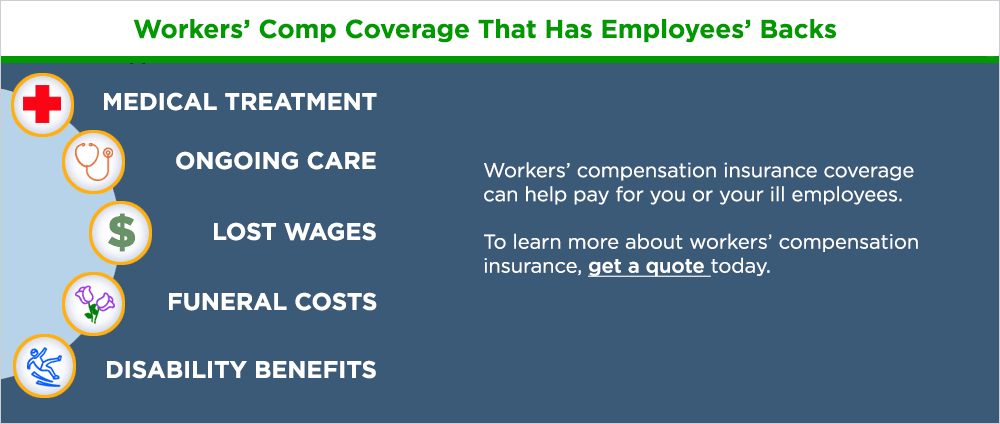All it takes is a few clicks.
What Is Workers’ Compensation Insurance?
Workers' compensation insurance gives employees medical, wage and other financial benefits if they are injured or become ill on the job. This coverage is required in most states. Workers' compensation insurance is also known as workman's comp or workers' comp insurance.

How Much Is Workers’ Comp Insurance?
 Most of our customers with less than $300,000 annually in payroll paid an average of $81 a month for workers’ compensation insurance, also known as workers’ comp insurance.**
Most of our customers with less than $300,000 annually in payroll paid an average of $81 a month for workers’ compensation insurance, also known as workers’ comp insurance.**
It’s important to know that the cost of workers’ compensation insurance varies between businesses. Insurance companies look at different factors when determining premiums, so there’s no standard cost. Factors can include:
- Payroll accessed through an audit
- Industry
- Claims history
- Type of work
Most states require businesses to have workers’ compensation insurance if they have employees. What does workers’ comp cover? It helps employees recover from serious work-related injuries or illnesses. The benefits received by the employees are not taxable at the federal or state level.
What Is the Average Workers’ Compensation Insurance Cost for Customers of The Hartford?
On average, small businesses insured by The Hartford pay an average of $1,032 per year, or $86 a month, for workers’ compensation coverage.** Insurance companies use different factors to determine workers’ compensation insurance costs. There isn’t one set rate for small business customers. The price each business pays depends on many variables, starting with what they do.
Check out our quiz if you’re interested in learning how to calculate the workers’ compensation insurance cost for your business.
What Are the Factors on Which Workers’ Compensation Premiums Are Based?
Since not all workers’ comp premiums are the same, calculating workers’ comp can include a few things. Several factors that can affect workers’ comp rates include:
State Requirements
Workers’ compensation laws vary by state. Most states require businesses with at least one employee to have workers’ compensation insurance, but there are exceptions. For example, in Arkansas small business owners with less than three employees don’t need coverage.
You can find your state’s average cost of workers’ compensation premium in the table below:
Rates by State
| State | Average Issued Premium** |
|---|---|
| AL | $1,448 |
| AR | $998 |
| AZ | $1,116 |
| CA | $1,600 |
| CO | $759 |
| CT | $1,555 |
| DC | $1,081 |
| DE | $976 |
| FL | $1,149 |
| GA | $1,041 |
| IA | $505 |
| ID | $1,211 |
| IL | $1,062 |
| IN | $862 |
| KS | $946 |
| KY | $837 |
| LA | $1,069 |
| MA | $990 |
| MD | $839 |
| ME | $1,220 |
| MI | $740 |
| MN | $1,181 |
| MO | $1,428 |
| MS | $1,435 |
| MT | $1,033 |
| NC | $1,009 |
| NE | $809 |
| NH | $1,149 |
| NJ | $1,079 |
| NM | $1,423 |
| NV | $906 |
| NY | $998 |
| OK | $1,150 |
| OR | $1,166 |
| PA | $935 |
| RI | $1,721 |
| SC | $1,234 |
| SD | $703 |
| TN | $1,109 |
| TX | $576 |
| UT | $666 |
| VA | $840 |
| VT | $1,300 |
| WI | $1,173 |
| WV | $557 |
It’s a good idea to work with a business insurance specialist to make sure you understand and comply with your local laws.
The Number of Employees and Payroll
The bigger your staff, the more it’ll cost for workers’ comp coverage. That’s because your business’ payroll is part of the premium (annual cost) calculation for workers’ compensation insurance. Your cost is calculated per $100 of payroll. So, if your payroll is larger, you can expect to pay a higher premium.
Types of Work Done by Employees
Jobs with higher levels of risk result in higher workers’ comp costs. For example, an accountant faces a lower risk of injury than a lumberjack. Riskier work that has a greater potential for workplace injuries, illnesses or death can cost more for coverage.
Claims History
Your claims history can also impact your workers’ compensation cost. If you’ve submitted a large amount of workers’ compensation claims in the past, you will likely pay a higher rate. The more severe these claims are, the higher your cost will be as well.
Pay-as-You-Go Workers’ Comp Insurance
Pay-as-you-go workers’ comp insurance allows you to pay for coverage based on your actual payroll. There’s no downpayment and you pay for your workers’ comp coverage based on your schedule for payroll.
If you’re wondering how to get pay-as-you-go workers’ comp insurance, you can call your insurer or your payroll provider.
How Do Workers’ Comp Class Codes Impact Insurance Cost?
The National Council on Compensation Insurance (NCCI) maintains workers’ comp class codes. The NCCI bases class codes on the types of jobs that workers’ do, which helps insurers calculate worker’s compensation cost. Having high-risk class code employees can result in a higher workers’ compensation cost.
4 Ways To Save on the Cost of Workers’ Compensation Insurance
1. Training Your Employees
Training employees on proper workplace procedures can help reduce the likelihood of injuries, which could help lower your workers’ compensation insurance cost.
2. Choosing the Right Limits and Deductible
Raising your deductible can help lower your insurance rate. Your deductible is the amount you pay out of pocket before your insurance company covers a claim.
3. Having Safety Standards
Prioritizing workplace safety at your business can help you identify and mitigate workplace hazards before they occur. This can help lower the amount of workers’ compensation claims submitted.
4. Bundling Your Policies
Bundling can help you save money on insurance. For example, bundling your workers’ compensation and general liability coverages could help you save on both policies.
At The Hartford, we’re backed by more than 200 years of experience. Our specialists are ready to help you get workers’ comp insurance and any other type of coverage you may need at the right price.
Get a quote today and see how we can help protect your business.
Last Updated: April 11, 2025
** Costs, premiums, and coverages mentioned are estimates and are not guaranteed. Actual cost, premium, and coverage are determined at the time of quote or issue and are specific to an individual risk. Premiums are based on information provided to The Hartford, including, but not limited to, underwriting and rating criteria. All examples included on this website or in an advertisement are intended for informational purposes only and are not an offer or a guarantee of premium or coverage. Coverage and products described are subject to the terms and conditions found in the policy contract. Any educational information provided about available coverages does not modify the policy language or imply that any claim is covered. Products are not available in all states or for all businesses.
